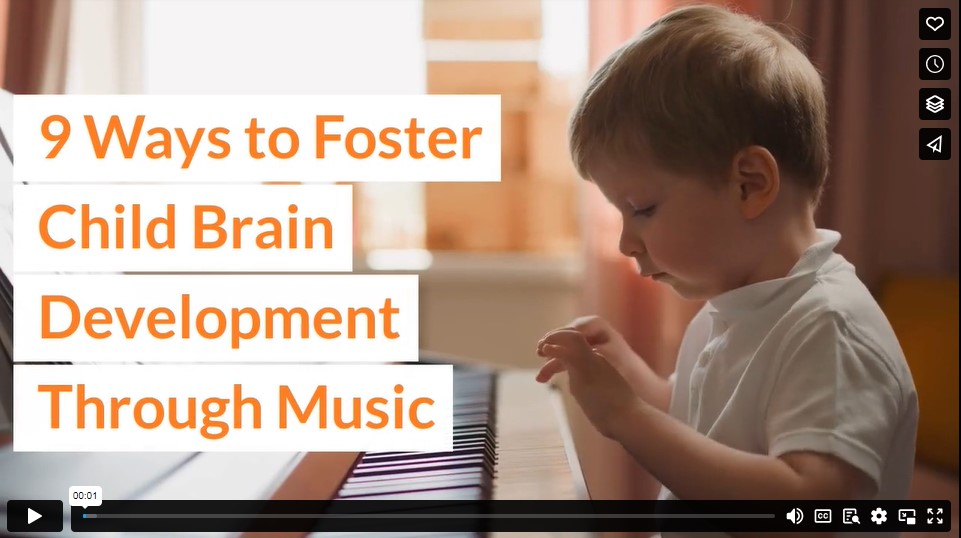It’s no secret: music can have a profound effect on the mind. A light, joyful melody can change the course of a bad day. An upbeat tune can motivate us to go a little further on a morning jog. And an instrumental of a favorite love song can inspire tears when a bride walks down an aisle.
Music connects with our minds in a way that nothing else can. It carries with it a harmonic, mathematical complexity that can be heard as well as seen. In the brain, neurons respond to music by creating pathways in the corpus callosum which connects the left and right hemispheres. The pathways created by the processing of music allow messages to be transmitted through the brain in a faster and more effective way. Although it is often viewed as nothing more than a pastime or form of art, music has proven to be critical to healthy brain function and development.
Music has the unique ability to engage the visual, auditory, and motor cortices of the brain at the same time. When multiple cortices of the brain work together to process a stimulus, it engages in a robust exercise that promotes advanced development. When children actively participate in music-related learning and activities, they strengthen a variety of neural and physical functions which then contribute to the development of other cognitive and motor skills.
Here at Academy of Scholars, a private school in Atlanta, our teachers use music as a tool to enhance learning in every classroom. Whether at school or in the home, there are many ways that parents and teachers can utilize music to encourage brain development in children, such as through listening to music, clapping out rhythms, and by teaching students to read music.
So, if you’re wondering how you can help boost your child’s brain development through music at home, here are some important tips and tricks:
1. Expose Children to Music Early On
Did you know that the same neural connections forged by music in the brain of a child can also be developed before they’re born? Even babies in the womb can experience the positive effects of music. This means that it’s never too early to begin exposing children to melodies.
2. Expose Children to Music Frequently
Make sure music is part of your daily routine. Sing clean up songs, play some tunes on your way to school, and end the day with a lullaby. The more children are exposed to music, the more effectively their brains will learn to process it.
3. Expose Children to Diverse Genres and Styles of Music
Most of us have a favorite genre of music. Yours might be classic rock, modern pop, or country. However, it’s crucial to expose children to a wide variety of genres and styles. Because each style of music has its own distinct characteristics, children who listen to and learn to process a diverse range of music will see enhanced neural development.
4. Combine Music with Stories
If you want to add some excitement to story time, try making your own soundtrack. Choose a story and make a playlist, including an instrumental track for each section of the book. For example, you might play a light, simple tune in the beginning, when the character is enjoying daily life. Then, when a troublesome event takes place, switch the music to something more mysterious and dramatic. And when that “happily ever after” finally comes, play a finale that swells with joy and ends in an exciting resolution.
5. Encourage Musical Play
Provide young children with various music-making toys, such as maracas, tambourines, or miniature drums and pianos. Then turn on some fun, upbeat music, and encourage them to play along with their instrument. To make it a game, have them switch instruments each time you stop the music.
6. Clap and Tap Beat and Rhythm
Children who learn to hear and replicate beats and rhythms unlock distinct and diverse neurological functions. Even stopping to listen and find the beat is like a workout for the brain. Begin with songs that have simple beats in the 4/4 time signature that aren’t too fast or too slow. Then have your child clap or tap the beat. Once they’ve mastered this, move on to faster songs, different time signatures, and more advanced rhythms.
7. Play Musical Games
Kids love to play games that involve music. Games like musical chairs, freeze dance, or “name that tune” are a fun way to help your child listen to and process music in a way that encourages cognitive development.
8. Use Songs for Learning
Music can also be a great way to help children remember important information. Teach your child songs that help them learn the days of the week, abc’s, or counting by 2’s. You can even make up your own songs that will allow your child to memorize your phone number and home address.
9. Encourage them to Learn an Instrument
Children as young as kindergarten can begin taking lessons for various musical instruments. When your child learns to play an instrument, they’re taught music theory in a deeper way than what they might learn in school music classes. Understanding the mathematics of music theory is a great way to boost cognitive development, and some studies have even found a link between music reading and higher IQs.
Music is magical. It connects to the heart, the soul, and the mind in ways that nothing else can. Because of its ability to connect with multiple cortices of the brain, music is fundamental to fostering cognitive development in children of all ages.
Video

Infographic
Music can engage multiple brain cortices simultaneously, promoting advanced development. If you’re wondering how to boost your child’s brain development through music at home, check out the infographic for tips and tricks.

